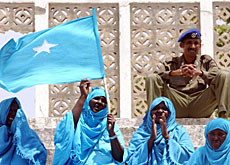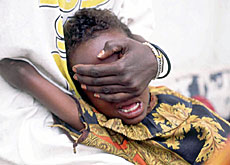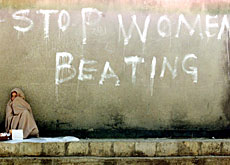Unicef urges action against female cutting

The United Nations children’s fund says the practice of female genital cutting – common in parts of Africa – is an issue in Switzerland, due to immigration.
In a report on Friday, Unicef points out that 7,000 women and girls now living in Switzerland have undergone the procedure.
The UN body is calling for action, including better training of medical professionals and social workers to deal with the issue.
It says migrants should be informed about the health risks involved and the consequences of breaking the law. Dialogue with migrant families and girls threatened by the practice is an essential aspect of prevention, it adds.
Unicef estimates that as many as 130 million women and children around the world have undergone some form of the traditional practice, which involves cutting away part of the female genitals.
It warns that genital cutting can lead to lifelong health problems and an increased risk of dying or being permanently injured during childbirth.
As a result of immigration – principally from Somalia, Ethiopia and Eritrea – around 7,000 circumcised women and girls are currently living in Switzerland, where the practice is punishable by law, according to Unicef.
Survey
“Female genital mutilation is a taboo, not only in the countries where it is practised, but also in Europe,” said Elsbeth Müller, secretary general of Unicef Switzerland.
To cast more light on the issue in Switzerland, Unicef carried out a survey last year of 1,800 medical staff and social workers. It found that 61 per cent of gynaecologists and 38 per cent of midwives had treated circumcised women.
Forty per cent of those questioned had had to deal with problems resulting from female cutting.
Four doctors and two midwives said they had been asked to carry out the operation.
Medical workers said they believed that genital cutting was being carried out in Switzerland by foreign doctors: 203 professionals said they had heard of such cases.
More information
The survey revealed a lack of information about the problem in Switzerland. Three-quarters of those questioned said the issue should be addressed during medical training.
Doctors and social workers also called for professional-conduct guidelines on dealing with the problem.
Unicef says female genital cutting is punishable by law in Switzerland because it entails serious physical injury. Parents who send their daughters abroad to undergo circumcision are also guilty of breaking the law, it says.
The children’s fund also points out that as a signatory state of the European Convention on Human Rights, Switzerland is legally obligated to protect girls against the practice.
swissinfo with agencies
1,799 medical and social workers in Switzerland took part in the Unicef survey.
518 of them said they had treated circumcised women.
203 people said they had heard of cases of girls being circumcised in Switzerland.
Four doctors and two midwives said they had been asked to carry out the operation.
Worldwide over 130 million women and girls have been circumcised.
In Switzerland, around 7,000 women are affected.
As a signatory state of the European Convention on Human Rights, Switzerland is obligated to protect women against forced circumcision.

In compliance with the JTI standards
More: SWI swissinfo.ch certified by the Journalism Trust Initiative


You can find an overview of ongoing debates with our journalists here. Please join us!
If you want to start a conversation about a topic raised in this article or want to report factual errors, email us at english@swissinfo.ch.